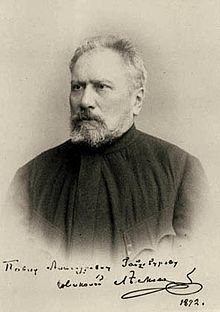The Sentry (Nikolai Leskov)
The guard , also called Man in the Sentry House ( Russian Человек на часах , Tschelowek na Tschassach ), is a story by the Russian writer Nikolai Leskow , which appeared in the April issue of the Moscow magazine Russkaya Mysl in 1887 under the title Rescue of a Drowning Man .
background
In the first of the eighteen chapters - all written in the lapidary style - Leskow emphasizes: “This half courtly, half historical story characterizes… the customs and spirit… of the… epoch of the thirties of the nineteenth century, of which very few representations exist. In the following narrative nothing is invented. "
Nikolai Ivanovich Miller, after whose report the text was written, was at the time head of the guard company in which the eponymous guard, the soldier Postnikov, served. The company belonged to the Ismailov regiment.
Leskow lived next door to Baron AE Stromberg, Miller's son-in-law, from 1880–1885. The bishop appearing in the 16th and 17th chapters is the Moscow Metropolitan Filaret Drozdov .
content
Winter of 1839 around Epiphany in the Petersburg Winter Palace : Tsar Nikolai Pavlovich has gone to bed. A quiet night is ahead, says Captain Miller, picking up a book. He was told that Soldier Postnikov had left his post without permission, the sentry near the Jordan driveway. In response to nightly calls for help, the soldier pulled a drowning man out of an ice hole on the Neva . Extremely excited, the company commander puts his reading aside, asks the common Postnikov and immediately reports the incident in writing to the battalion commander, Lieutenant Colonel Swinjin.
When the letter reaches the lieutenant colonel, he jumps out of bed, puts on his uniform and soon wants to despair over a detail of the report. Postnikov confessed to Miller how he was caught during his rescue operation on the ice by a passing officer from the disability squad. Swinjin infected Postnikov in the lockup and throws Miller an excess of humanity before.
The tsar must not see what happened. But the officer from the Invalid Command reported his observation long ago to General Kokoschkin, the Chief Police Officer of Petersburg. The general reports to the ruler very early every morning. There is a hurry. Swinjin reports to the general.
It turns out in conversation that Kokoschkin doesn't know anything yet. The general lets the rescued come and asks him in the presence of the officer from the disability squad about the course of the accident. The rescued one says: He owes his life to this officer. The officer had only brought the soaked rescued person to the police office near the Admiralty in Morskaya. The policeman on duty there at the office had wondered how the rescuer had stayed dry. The soaked Postnikov had long since taken up his post at the sentry house.
The general asks the officer for witnesses to the rescue operation. The one from the Invalidenkommando calls the guard. Kokoschkin doesn't want to hear that again. One guard always remains at the sentry house. Basta.
General Kokoschwin is still making sure that the officer from the Invalid Command had previously been with the Grand Duke. The officer says no. He went straight to the general. For this, the chief police officer attaches the life-saving medal to his chest. The common postnikov got two hundred strokes of the rod in front of the front.
reception
Reissner wrote in 1971: “Nobody dares to stand up for humanity and justice, fraud is rewarded, unselfishness is punished. In the end everyone is satisfied with themselves and the world, absurdly even Postnikov, he had to expect even worse. "
German-language editions
- The man in the sentry house. German by Siegfried von Vegesack . Illustrations by Marianne Richter. P. 5–22 in Nikolai Lyesskow: The man in the shield house. Novellas. 157 pages. Alster Verlag Curt Brauns, Wedel in Holstein 1949 (1st edition)
- The sentry. German by Ena von Baer . P. 309–333 in Nikolai S. Leskow: At the end of the world and other master stories. 391 pages. Dieterich'sche Verlagsbuchhandlung, Leipzig 1968 (2nd edition)
Output used:
- The sentry. German by Charlotte Kossuth . P. 328–350 in Eberhard Reissner (Ed.): Nikolai Leskow: Collected works in individual volumes. The juggler pamphalon. 616 pages. Rütten & Loening, Berlin 1971 (1st edition)
Web links
- The text
- Wikisource Человек на часах (Лесков) (Russian)
- online at Lib.ru / Classic (Russian)
- online at RVB.ru (Russian)
- Entry in the Laboratory of Fantastics (Russian)
- Man in the sentry house Entries in WorldCat
- The sentry posts in WorldCat
Individual evidence
- ↑ Russian. The Russian thought
- ^ Reissner in the follow-up to the edition used, p. 601, 18. Zvu
- ↑ Edition used, p. 328, 8. Zvo
- ↑ Russian Lieutenant General Nikolai Ivanovich Miller
- ^ Russian Ismailov Life Guard Regiment
- ^ Russian. The Barons Stromberg
- ^ Jordan stairs , see also Russian Jordan gallery
- ↑ Russian commoner
- ↑ Russian Свиньин, Никита Петрович (Nikita Petrovich Swinjin)
- ↑ Russian Invalid Command
- ↑ Russian Sergej Alexandrowitsch Kokoschkin
- ↑ Russian Schreinergasse
- ↑ Michael Pavlovich
- ↑ russ. За спасение погибавших - sa spassenije pogibawschich
- ^ Reissner in the follow-up to the edition used, p. 602, 2nd Zvo
